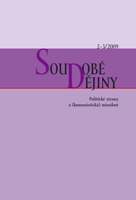Srdce Václava Talicha se ztratilo: K problému národní očisty (2. část)
Václav Talich Has Lost Heart: On the Purging of the Nation (Part 2)
Author(s): Jiří KřesťanSubject(s): History
Published by: AV ČR - Akademie věd České republiky - Ústav pro soudobé dějiny
Summary/Abstract: Part 1 of this article, published in Soudobe dějiny, vol. 16 (2009), no. 1, pp. 69–111, analyzed the dilemmas facing Vaclav Talich (1883–1961), Principal Conductor of the National Theatre Opera and the Czech Philharmonic during the Second World War. Part 1 also considers the consequences he had to face after the Liberation, including the changes in his relations with the historian, musicologist, and post-war Communist politician Zdeněk Nejedly (1878–1962). Part 2 focuses on the debate that accompanied the ‘Talich Case’. In 1945, after the Liberation, Talich was accused of collaboration with the Nazis. Though the investigation showed that his behaviour had not been impeccable, it did not conclude that Talich should be punished. None the less, his public work as a conductor was restricted after the war. The article discusses the attitudes of leading fi gures in musical life, journalists, and politicians towards the ‘Talich Affair’, and refutes the view that proponents of a certain political view or artistic trend came out together against Talich. Among those who defended him and demanded that he should be allowed to work in music were a number of Communists (including the playwright and director Emil František Burian, the poet Vitězslav Nezval, the opera singer Přemysl Koči, and, in his own way, the politician Antonin Zapotocky). Another erroneous view, formulated by the musicologist Mirko Očadlik (1904–1964), was that it all had to do with a dispute between Talich and the ‘Nejedly School’, which was carrying on the musical legacy of Bedřich Smetana. Talich was given support also by many musicians, particularly from the Czech Chamber Orchestra, which he founded in 1946. The author puts the Talich case into the broader context of the post-war settling of scores with real or imagined henchmen and sympathizers of the German forces of occupation. He considers the character of the people forming the moral judgements, by examining their attitudes towards Communism and its desired dictatorship of the proletariat and class struggle. Particularly Nejedly, who repeatedly criticized Talich publicly after the war, and did not try to understand the motives behind his behaviour in the Protectorate, showed very little courage when standing face to face with Stalinist repression. On the whole, however, it is fair to say that the politicians involved (including President Edvard Beneš) showed considerable restraint in the Talich case, and made it possible to investigate his war-time behaviour thoroughly according to the law.
Journal: Soudobé Dějiny
- Issue Year: XVI/2009
- Issue No: 02-03
- Page Range: 243-275
- Page Count: 33
- Language: Czech

